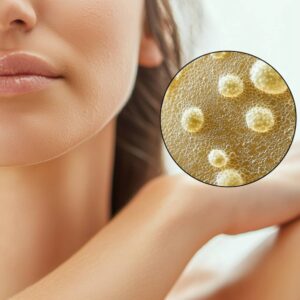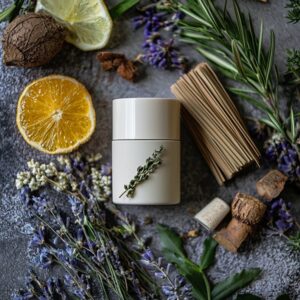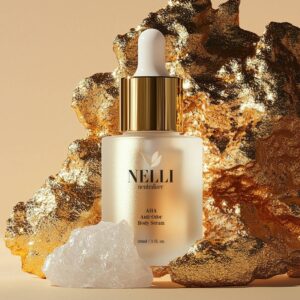
Let’s talk about something no one really wants to discuss—but everyone experiences: why do my armpits stink? It’s a natural part of being human, and just like your fingerprint, your scent is totally unique. Yes, science says so!
Believe it or not, your body odour is as individual as your DNA. Researchers have discovered that genetics plays a key role in determining how we smell. From the kind of bacteria that thrive on your skin to the way your body processes sweat, it’s all written in your genes.
Table of Contents
Understanding the Biochemistry of Body Odor
Body odor is a common yet often misunderstood phenomenon. At its core, the science of body odor boils down to sweat and the bacteria that interact with it.
Humans have three types of sweat glands—apocrine, eccrine, and sebaceous—each playing a unique role in how our bodies sweat.
While eccrine glands are spread throughout the body, the apocrine and sebaceous glands are more specialized and found in specific areas like the armpits, scalp, and genitals. It’s the apocrine glands, activated during puberty, that are the main contributors to body odor.
These glands secrete a thick, oily fluid made up of proteins, lipids, and steroids, naturally odorless substances. However, when bacteria from the skin microbiota break down these secretions, they release malodorous byproducts.
So, why do my armpits stink? The armpits, being warm and moist, provide an ideal environment for these bacteria to thrive, making them a key hotspot for body odor production.

Now that we’ve explored the science behind body odor, let’s take a fun detour with 11 interesting facts about body odor that might surprise you!
1. Why Do My Armpits Stink? Bacteria Are to Blame
Surprise! Sweat itself is completely odorless. The stench happens when the bacteria living on our skin feast on the proteins and lipids in our sweat. This feast produces foul-smelling compounds like thioalcohols, which are behind that infamous “BO” smell.
- Sweat is 99% water, odorless by nature
- Bacteria on the skin break down sweat into smelly byproducts
- Thioalcohols are the real culprits—often described as “oniony” or “sulfuric”
2. Your Genes Influence How You Smell, and How You Smell Others
That friend who swears you don’t smell bad… might not just be being nice. Genetic variations in a receptor gene called OR7D4 affect how people perceive body odor. What smells strong to one person might be faint or even pleasant to another.
- The OR7D4 gene influences perception of odor molecules
- Some people can’t even detect the same body odors others do
- This genetic twist may even influence who you find attractive!
3. Body Odor Can Signal Health Conditions
If you’ve ever wondered why do my armpits stink, it could be more than just a sign of sweat. Doctors have long believed that changes in body odor can reflect underlying health issues or hormonal imbalances.
Certain metabolic disorders, infections, or diseases can alter your natural scent in noticeable ways, and sometimes, your body is trying to tell you something.
- Fruity-smelling sweat may indicate uncontrolled diabetes (ketoacidosis)
- A bleach-like odor could suggest liver or kidney dysfunction
- A fishy smell may signal a rare condition called trimethylaminuria
4. Diet Directly Affects Your Scent
Why do my armpits stink? You really are what you eat, especially when it comes to how you smell. Certain foods contain compounds that seep into your bloodstream and are released through your sweat glands. And yes, they can make you stink.
- Garlic and onions contain sulfur-rich compounds that ooze out in sweat
- Red meat can cause body odor to become more intense
- Spicy food activates sweat glands and adds extra aroma
5. Stress Sweat Smells Worse
Why do my armpits stink? Well, not all sweat is created equal. There are two types: eccrine (mostly water) and apocrine (rich in proteins).

Stress activates apocrine glands, and their thicker sweat becomes a buffet for odor-causing bacteria. So yes, nervous sweat really does smell worse.
- Stress sweat comes from apocrine glands, mostly in the underarms
- It contains proteins and fatty acids, perfect for bacterial breakdown
- It produces stronger, muskier, and longer-lasting odors
6. Your Body Odor Is as Unique as a Fingerprint
Why do my armpits stink? Your scent is your own personal signature—literally. Just like fingerprints, your body odor is unique to you, shaped by your genetics, diet, environment, and microbiome. That means no two people smell exactly alike!
- Your natural scent is called an “odorprint”
- Genetics and your skin’s bacteria make your scent uniquely yours
- Even identical twins have slightly different odor profiles
7. Body Odor Similarity Can Foster Friendships
You may be *literally* following your nose to find friends. A recent study found that people with similar body odor profiles were more likely to bond. Your nose might subconsciously sniff out your kindred spirits!
- Friends tend to have chemically similar body odors
- Scent similarity may promote social bonding and comfort
- It’s not just love at first sight—it could be “friendship at first sniff”
8. Men vs Women: Why the Smell Might Be Stronger
Here’s something science has confirmed: Why do my armpits stink? Men sweat more than women. It’s not just a myth—it’s biology. Men tend to have larger and more active sweat glands, which means they produce more moisture throughout the day. And where there’s sweat, there’s bacteria ready to feast.
This extra dampness creates the perfect playground for Corynebacterium, a type of bacteria that breaks down sweat and releases volatile fatty acids—those are the compounds responsible for that intensely cheesy body odor (we’re talking mature cheddar vibes, not the kind you want).
Sweaty Science Facts:
- Men have more active apocrine glands, the type responsible for odorous sweat.
- More sweat = more food for bacteria, especially in the underarms.
- Corynebacterium thrives in moist areas and breaks down sweat into smelly acids.
- The result? A stronger, more pungent body odour—often described as cheesy or musky.
9. The “Nursing Home Smell” Explained: How Age Affects Body Odour
You’ve probably heard of the so-called “nursing home smell.” While it might sound like a stereotype, it’s actually a real chemical phenomenon that happens as we age.
As our skin ages, its chemistry changes, and one particular compound starts to emerge: 2-nonenal. This unsaturated aldehyde brings a greasy, grassy scent that contributes to the distinctive smell often associated with older skin.
Why Our Scent Changes with Age:
- Skin chemistry shifts over time, affecting the way we smell.
- 2-nonenal is produced when omega-7 unsaturated fatty acids break down on the skin.
- This compound has a greasy, grassy scent, which some associate with older skin.
- Body odour evolves as we age, often becoming less pleasant and more noticeable.
10. Deodorants and Antiperspirants Alter Your Skin Microbiome
If you’ve ever wondered why do my armpits stink, the answer might lie in what you’re applying to your skin.

What you put under your arms can actually change your skin’s entire microbial landscape. Regular use of deodorants and antiperspirants shifts the balance of bacteria living in your armpits, potentially changing your natural scent over time.
- These products kill some bacteria but let others thrive
- This reshaping of your microbiome affects your baseline body odor
- Going product-free for a while may “reset” your scent
11. “Asians Don’t Smell”: The Science Behind the Myth
Ever heard the phrase “Asians don’t smell”? Well, there’s actually a genetic reason behind this stereotype, and it’s not just a myth. A key factor lies in a gene called ABCC11, which plays a crucial role in the way our bodies produce sweat. This gene is responsible for producing a protein that helps transport compounds through cell membranes, specifically in the sweat glands.
In 80-95% of East Asians, the ABCC11 gene is non-functional, meaning it doesn’t produce the usual sweat compounds that are typically released to the surface of the skin, especially in the underarm area. So, what happens when sweat doesn’t make it to the skin? Simple—there’s less fuel for bacteria to break down, which means virtually no body odor in that region.
While the absence of these compounds might lead to less odor in some individuals, it’s also a great example of how our genetics shape our body odor. Jealous? It’s okay, science has its quirks!
Why Do My Armpits Stink? A Solution That Works
Now that you understand the science behind body odor, you can take steps to manage it. If you’re looking for a powerful solution that tackles body odor at its source, Nelli Neutralizer Anti-Odor Serum is here to help.
Formulated with advanced ingredients that neutralize odor-causing bacteria while being gentle on your skin, this serum is designed to keep you fresh and confident all day long. Say goodbye to unwanted body odor and hello to a more comfortable, odor-free you. Try Nelli Neutralizer Anti-Odor Serum today for a long-lasting, effective solution!
Why do my armpits stink? It’s Science, Not Shame
Your body odor tells a unique story—one of your biology, your culture, and your daily habits. If you’ve ever wondered, “Why do my armpits stink?”, it’s not just about sweat. It’s science!
The way your body produces sweat and how bacteria interact with it play a huge role in creating that scent. With the right knowledge (and maybe a powerful anti-odor product on your side), you can tackle body odor confidently, stay fresh, and embrace the unique scent that is you.




